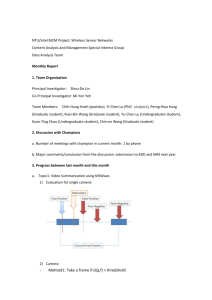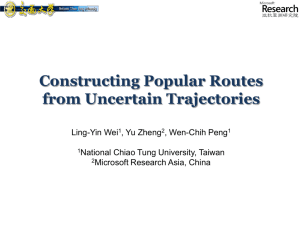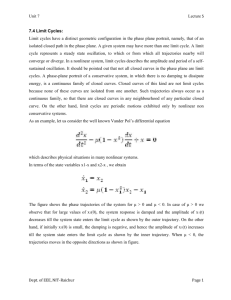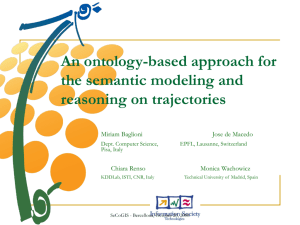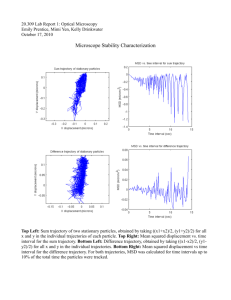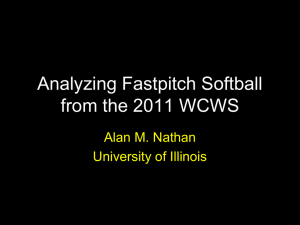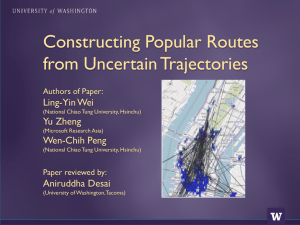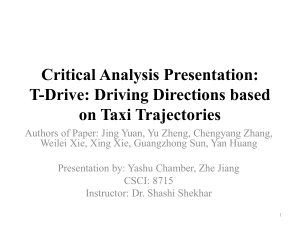03-Trajectory Data Mining-Trajectory
advertisement
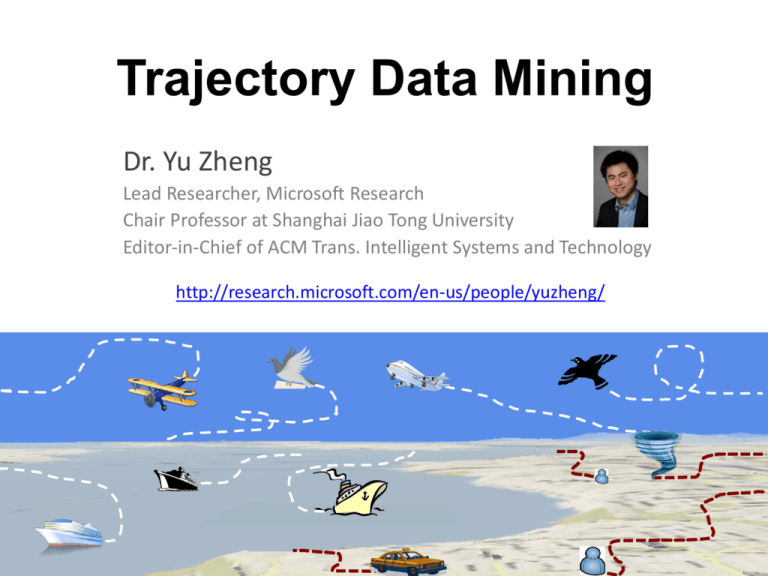
Trajectory Data Mining Dr. Yu Zheng Lead Researcher, Microsoft Research Chair Professor at Shanghai Jiao Tong University Editor-in-Chief of ACM Trans. Intelligent Systems and Technology http://research.microsoft.com/en-us/people/yuzheng/ Paradigm of Trajectory Data Mining Uncertainty Privacy Preserving Reducing Uncertainty Traj. Pattern Mining Moving Freq. Seq. Together Patterns Patterns Periodic Clustering Patterns Trajectory Indexing and Retrieval Distance of Query Historical Trajectory Trajectories Trajectory Classification Trajectory Outlier/Anomaly Detection Managing Recent Trajectories Trajectory Preprocessing Map-Matching Stay Point Detection Noise Filtering Graph Mining Routing Matrix Analysis TD Compression MF Segmentation CF Matrix Spatial Trajectories Spatial Trajectories Spatial Trajectories Tensor Graph Yu Zheng. Trajectory Data Mining: An Overview. ACM Transactions on Intelligent Systems and Technology. 2015, vol. 6, issue 3. Uncertain trajectories • check-ins or geo-tagged photos • Taxi trajectories, trails of migratory birds ... ... ... Trajectory Uncertainty • Reducing Uncertainty from Trajectory Data Enhance its utility – Modeling Uncertainty of a Trajectory for Queries – Path Inference from Uncertain Trajectories • Make a trajectory even more uncertain Protect a user’s privacy 8km p1 p2 R p3 A) Trajectories of vehicles 50km B) A sequence of check-ins C) GPS traces of migratory birds Trajectory Uncertainty • Modeling Uncertainty of a Trajectory for Queries Trajectory Uncertainty • Path Inference from Uncertain Trajectories – In a road network – In a free space Constructing Popular Routes from Uncertain Trajectories in Free Space In KDD 2012 . Ling-Yin Wei, Yu Zheng, Wen-Chih Peng, Constructing Popular Routes from Uncertain Trajectories. KDD 2012. Constructing Popular Routes from Uncertain Trajectories • Goal: Using collective knowledge: The route may not exist in the dataset – Mutual reinforcement learning (uncertain + uncertain certain) ... ... ... ... ... ... ... ... ... ... Ling-Yin Wei, Yu Zheng, Wen-Chih Peng, Constructing Popular Routes from Uncertain Trajectories. KDD 2012. ... ... Concatenation ... ... ... ... ... Mutual reinforcement construction ... ... ... ... ... ... ... ... ... Constructing Popular Routes from Uncertain Trajectories • Problem – Given a corpus of uncertain trajectories and – a user query: some point locations and a time constraint – Suggest the top k most popular routes ... ... ... ... ... ... ... ... ... ... ... ... ... ... ... Framework Overview • Routable graph construction (off-line) Region: Connected geographical area Edges in each region Edges between regions Routable Graph 11 Framework Overview • Routable graph construction (off-line) • Route inference (on-line) q1 Local Route Global RouteSearch Search q2 q3 Popular Route Routable Graph 12 Region Construction (1/3) • Space partition – Divide a space into non-overlapping cells with a given cell length • Trajectory indexing Grid Index Sorted by median density l l GID Density TID PID (1,4) Tra3 1 Tra1 (1,1) (2,1) (3,1) (4,1) Tra2 (1,2) (2,2) (3,2) (4,2) Tra5 1 Tra3 (1,3) (2,3) (3,3) (4,3) Tra1 1 Tra4 (1,4) (2,4) (3,4) (4,4) Tra5 3 Transformed Trajectory TID Sequence of GIDs Median Density Tra3 (1,4)(1,3)(3,2)(4,1) 2 13 Region Construction (2/3) • Region – A connected geographical area • Idea – Merge connected cells to form a region • Observation – Tra1 and Tra2 follow the same route but have different sampled geo-locations p 31 Spatially close p p 1 1 p13 2 1 p 1 2 p 23 p 22 p 32 tra1 tra2 tra3 Temporal constraint 14 Region Construction (3/3) • Spatio-temporally correlated relation between trajectories – Spatially close Δt1 p i1' p 2j ' p 2j ' pi1 Δt2 p 2j Rule1 Δt2 p 2j p i1' Δt1 1 i p Rule2 – Temporal constraint • Connection support of a cell pair – Minimum connection support C Ling-Yin Wei, Yu Zheng, Wen-Chih Peng, Constructing Popular Routes from Uncertain Trajectories. KDD 2012. Edge Inference [Edges in a region] Step 1: Let a region be a bidirectional graph first Step 2: Trajectories + Shortest path based inference – Infer the direction, travel time and support between each two consecutive cells [Edges between regions] • Build edges between two cells in different regions by trajectories Ling-Yin Wei, Yu Zheng, Wen-Chih Peng, Constructing Popular Routes from Uncertain Trajectories. KDD 2012. Local Route Search • Goal ▪ Top K local routes between two consecutive geo-locations qi, qi+1 • Approach – Determine qualified visiting sequences of regions by travel times – A*-like routing algorithm • where a route q1 R5 R1 q2 R3 R2 R4 Sequences of Regions from q1 to q2: R1→ R2 → R3 R1→ R3 Global Route Search • Input – Local routes between any two consecutive geo-locations • Output – Top K global routes • Branch-and-bound search approach – E.g., Top 1 global route q1 R5 R1 q2 R3 R2 R4 q3 18 Route Refinement • Input – Top K global routes: sequences of cells • Output – Top K routes: sequences of segments • Approach – Select GPS track logs for each grid – Adopt linear regression to derive regression lines 19 Route Inference from Uncertain Trajectories in a Road Network ICDE 2012 Kai Zheng, Yu Zheng, Xing Xie, Xiaofang Zhou. Reducing Uncertainty of Low-Sampling-Rate Trajectories. ICDE 2012. Methodology • Search for reference trajectories – • Local route inference – • Select the relevant historical trajectories that may be helpful in inferring the route of the query Inferring the routes between consecutive samples of query Global route inference – Inferring the whole routes by connecting the local routes Kai Zheng, Yu Zheng, Xing Xie, Xiaofang Zhou. Reducing Uncertainty of Low-Sampling-Rate Trajectories. ICDE 2012. Reference Trajectory Search • Simple reference based on eclipse T1, T2 – yes; T3, T4 – no • Sliced reference based on cascading – – T1, T2, T4 – not simple reference trajectory Parts of T1 and T2 can form a reference trajectory Local Route Inference Reference trajectories Check the density of reference points around the query points Yes For high density points Traverse Graph-Based Approach >𝜏 For sparse points No Nearest neighbor based approach Traverse Graph-Based Approach • Graph augmentation – – – A special case of the k-connectivity graph augmentation problem [1] i.e., add a minimum number (cost) of edges to a graph so as to satisfy a given connectivity condition transformed to the min-cost spanning tree problem when k = 1 • Graph reduction – – Remove redundant edges to save computational loads for the k-shortest path search in a graph Solved by transitive reduction algorithms [2] e.g., 𝑟3 → 𝑟5 is redundant, 𝑟4 → 𝑟2 is not 𝜆 = 2, i.e. one hop Use the k shortest paths of this graph as the candidate local possible route of the query [1] A. Frank, “Augmenting graphs to meet edge-connectivity requirements,” in Foundations of Computer Science. 2002 [2] A. Aho, M. Garey, and J. Ullman, “The transitive reduction of a directed graph,” SIAM Journal on Computing, 1972. Nearest Neighbor-Based Approach 1. Find the top-k nearest nodes to a query point Search for the top k most possible paths 2. Keep extending the nearest neighbours until reach the destination query point re-use the shares structure Global Route Inference Privacy of Trajectories • Protect a user from the privacy leak caused by the disclosure of the user’s trajectories – Real-time continuous location-based services • • • • • Spatial cloaking Mix-zones Path confusion Euler histogram-based on short IDs Dummy trajectories – Publication of historical trajectories • • • Clustering-based generalization-based Suppression-based Grid-based approach Thanks! Yu Zheng yuzheng@microsoft.com Homepage Yu Zheng. Trajectory Data Mining: An Overview. ACM Transactions on Intelligent Systems and Technology. 2015, vol. 6, issue 3.
